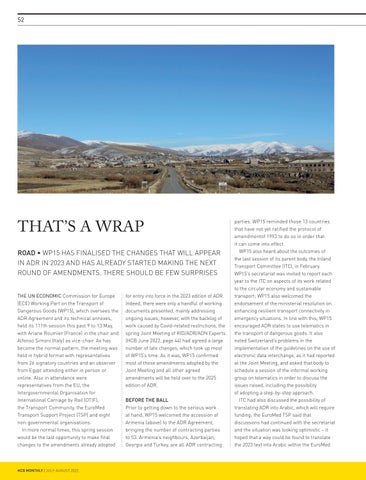52
THAT’S A WRAP ROAD • WP15 HAS FINALISED THE CHANGES THAT WILL APPEAR IN ADR IN 2023 AND HAS ALREADY STARTED MAKING THE NEXT ROUND OF AMENDMENTS. THERE SHOULD BE FEW SURPRISES THE UN ECONOMIC Commission for Europe (ECE) Working Part on the Transport of Dangerous Goods (WP15), which oversees the ADR Agreement and its technical annexes, held its 111th session this past 9 to 13 May, with Ariane Roumier (France) in the chair and Alfonso Simoni (Italy) as vice-chair. As has become the normal pattern, the meeting was held in hybrid format with representatives from 26 signatory countries and an observer from Egypt attending either in person or online. Also in attendance were representatives from the EU, the Intergovernmental Organisation for
for entry into force in the 2023 edition of ADR. Indeed, there were only a handful of working documents presented, mainly addressing ongoing issues; however, with the backlog of work caused by Covid-related restrictions, the spring Joint Meeting of RID/ADR/ADN Experts (HCB June 2022, page 44) had agreed a large number of late changes, which took up most of WP15’s time. As it was, WP15 confirmed most of those amendments adopted by the Joint Meeting and all other agreed amendments will be held over to the 2025 edition of ADR.
International Carriage by Rail (OTIF), the Transport Community, the EuroMed Transport Support Project (TSP) and eight non-governmental organisations. In more normal times, this spring session would be the last opportunity to make final changes to the amendments already adopted
BEFORE THE BALL Prior to getting down to the serious work at hand, WP15 welcomed the accession of Armenia (above) to the ADR Agreement, bringing the number of contracting parties to 53. Armenia’s neighbours, Azerbaijan, Georgia and Turkey, are all ADR contracting
HCB MONTHLY | JULY-AUGUST 2022
parties. WP15 reminded those 13 countries that have not yet ratified the protocol of amendmentof 1993 to do so in order that it can come into effect. WP15 also heard about the outcomes of the last session of its parent body, the Inland Transport Committee (ITC), in February. WP15’s secretariat was invited to report each year to the ITC on aspects of its work related to the circular economy and sustainable transport; WP15 also welcomed the endorsement of the ministerial resolution on enhancing resilient transport connectivity in emergency situations. In line with this, WP15 encouraged ADR states to use telematics in the transport of dangerous goods. It also noted Switzerland’s problems in the implementation of the guidelines on the use of electronic data interchange, as it had reported at the Joint Meeting, and asked that body to schedule a session of the informal working group on telematics in order to discuss the issues raised, including the possibility of adopting a step-by-step approach. ITC had also discussed the possibility of translating ADR into Arabic, which will require funding; the EuroMed TSP said that discussions had continued with the secretariat and the situation was looking optimistic – it hoped that a way could be found to translate the 2023 text into Arabic within the EuroMed































